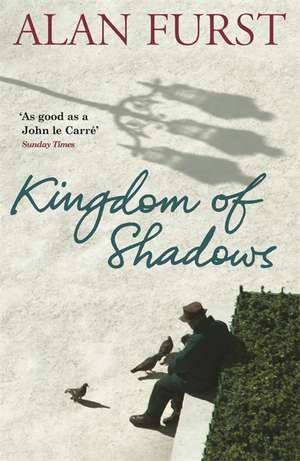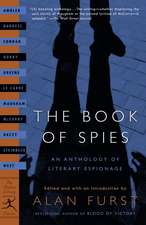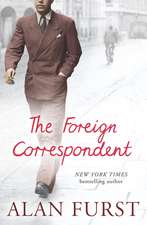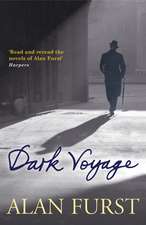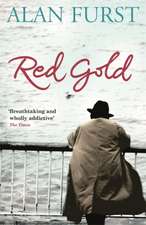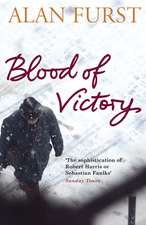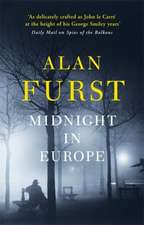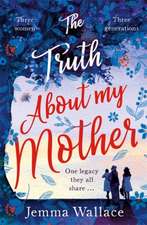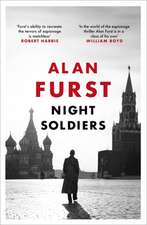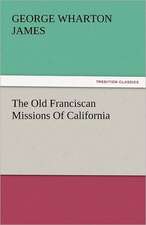Kingdom Of Shadows
Autor Alan Fursten Limba Engleză Paperback – 20 aug 2009
| Toate formatele și edițiile | Preț | Express |
|---|---|---|
| Paperback (2) | 47.72 lei 3-5 săpt. | +23.06 lei 7-13 zile |
| Orion Publishing Group – 20 aug 2009 | 47.72 lei 3-5 săpt. | +23.06 lei 7-13 zile |
| Random House Trade – 30 sep 2001 | 115.53 lei 6-8 săpt. |
Preț: 47.72 lei
Preț vechi: 63.11 lei
-24% Nou
Puncte Express: 72
Preț estimativ în valută:
9.13€ • 9.53$ • 7.56£
9.13€ • 9.53$ • 7.56£
Carte disponibilă
Livrare economică 15-29 martie
Livrare express 01-07 martie pentru 33.05 lei
Preluare comenzi: 021 569.72.76
Specificații
ISBN-13: 9780753825587
ISBN-10: 0753825589
Pagini: 288
Ilustrații: map
Dimensiuni: 134 x 197 x 23 mm
Greutate: 0.19 kg
Editura: Orion Publishing Group
Locul publicării:London, United Kingdom
ISBN-10: 0753825589
Pagini: 288
Ilustrații: map
Dimensiuni: 134 x 197 x 23 mm
Greutate: 0.19 kg
Editura: Orion Publishing Group
Locul publicării:London, United Kingdom
Notă biografică
Alan Furst is widely recognised as the master of the historical spy novel. Now translated into eighteen languages, he is the author of novels including MISSION TO PARIS, SPIES OF THE BALKANS - a TV Book Club choice - THE SPIES OF WARSAW, which became a BBC mini-series starring David Tennant and THE FOREIGN CORRESPONDENT.
Born in New York, he lived for many years in Paris and travelled as a journalist in Eastern Europe and Russia. He has written extensively for Esquire and the International Herald Tribune. He now lives in Long Island.
www.alanfurst.net
Born in New York, he lived for many years in Paris and travelled as a journalist in Eastern Europe and Russia. He has written extensively for Esquire and the International Herald Tribune. He now lives in Long Island.
www.alanfurst.net
Recenzii
"Furst’s writing has the seductive shimmer of an urbane black-and-white Hollywood classic."
--The New York Times
"Astonishingly, Alan Furst is not yet a household name. But perhaps [Kingdom of Shadows,] the sixth of his supple, elegant European spy novels, will do the trick."
--Janet Maslin, The New York Times
"Subtly spun, sensitive to nuances, generous with contemporary detail and information discreetly conveyed....It’s hard to overestimate Kingdom of Shadows."
--Eugen Weber, Los Angeles Times
"A triumph: evocative, heartfelt, knowing and witty."
--Robert J. Hughes, The Wall Street Journal
--The New York Times
"Astonishingly, Alan Furst is not yet a household name. But perhaps [Kingdom of Shadows,] the sixth of his supple, elegant European spy novels, will do the trick."
--Janet Maslin, The New York Times
"Subtly spun, sensitive to nuances, generous with contemporary detail and information discreetly conveyed....It’s hard to overestimate Kingdom of Shadows."
--Eugen Weber, Los Angeles Times
"A triumph: evocative, heartfelt, knowing and witty."
--Robert J. Hughes, The Wall Street Journal
Extras
On the tenth of March 1938, the night train from Budapest pulled into the Gare du Nord a little after four in the morning. There were storms in the Ruhr Valley and down through Picardy and the sides of the wagon-lits glistened with rain. In the station at Vienna, a brick had been thrown at the window of a first-class compartment, leaving a frosted star in the glass. And later that day there'd been difficulties at the frontiers for some of the passengers, so in the end the train was late getting into Paris.
Nicholas Morath, traveling on a Hungarian diplomatic passport, hurried down the platform and headed for the taxi rank outside the station. The first driver in line watched him for a moment, then briskly folded his Paris-Midi and sat up straight behind the wheel. Morath tossed his bag on the floor in the back and climbed in after it. "L'avenue Bourdonnais," he said. "Number eight."
Foreign, the driver thought. Aristocrat. He started his cab and sped along the quai toward the Seventh Arrondissement. Morath cranked the window down and let the sharp city air blow in his face.
8, avenue de la Bourdonnais. A cold, haut bourgeois fortress of biscuit-colored stone block, flanked by the legations of small countries. Clearly, the people who lived there were people who could live anywhere, which was why they lived there. Morath opened the gate with a big key, walked across the courtyard, used a second key for the building entry. "Bonsoir, Séléne," he said. The black Belgian shepherd belonged to the concierge and guarded the door at night. A shadow in the darkness, she came to his hand for a pat, then sighed as she stretched back out on the tile. Séléne, he thought, goddess of the moon.
Cara's apartment was the top floor. He let himself in. His footsteps echoed on the parquet in the long hallway. The bedroom door was open, by the glow of a streetlamp he could see a bottle of champagne and two glasses on the dressing table, a candle on the rosewood chest had burned down to a puddle of golden wax.
"Nicky?"
"Yes."
"What time is it?"
"Four-thirty."
"Your wire said midnight." She sat up, kicked free of the quilts. She had fallen asleep in her lovemaking costume, what she called her "petite chemisette," silky and black and very short, a dainty filigree of lace on top. She leaned forward and pulled it over her head, there was a red line across her breast where she'd slept on the seam.
She shook her hair back and smiled at him. "Well?" When he didn't respond she said, "We are going to have champagne, aren’t we?"
Oh no. But he didn't say it. She was twenty-six, he was forty-four. He retrieved the champagne from the dressing table, held the cork, and twisted the bottle slowly until the air hissed out. He filled a glass, gave it to her, poured one for himself.
"To you and me, Nicky," she said.
It was awful, thin and sweet, as he knew it would be, the caviste in the rue Saint-Dominique cheated her horribly. He set his glass on the carpet, went to the closet, began to undress.
"Was it very bad?"
Morath shrugged. He'd traveled to a family estate in Slovakia where his uncle's coachman lay dying. After two days, he died. "Austria was a nightmare," he said.
"Yes, it's on the radio."
He hung his suit on a hanger, bundled up his shirt and underwear and put it in the hamper.
"Nazis in the streets of Vienna," he said. "Truckloads of them, screaming and waving flags, beating up Jews."
"Like Germany."
"Worse." He took a fresh towel off a shelf in the closet.
"They were always so nice."
He headed for the bathroom.
"Nicky?"
"Yes?"
"Come sit with me a minute, then you can bathe."
He sat on the edge of the bed. Cara turned on her side, pulled her knees up to her chin, took a deep breath and let it out very slowly, pleased to have him home at last, waiting patiently for what she was showing him to take effect.
Oh well. Caridad Valentina Maria Westendorf (the grandmother) de Parra (the mother) y Dionello. All five feet, two inches of her. From one of the wealthiest families in Buenos Aires. On the wall above the bed, a charcoal nude of her, drawn by Pablo Picasso in 1934 at an atelier in the Montmartre, in a shimmering frame, eight inches of gold leaf Outside, the streetlamp had gone out. Through a sheer curtain, he could see the ecstatic gray light of a rainy Parisian morning.
Morath lay back in the cooling water of the bathtub, smoking a Chesterfield and tapping it, from time to time, into a mother-of-pearl soap dish. Cara my love. Small, perfect, wicked, slippery. "A long, long night," she'd told him. Dozing, sometimes waking suddenly at the sound of a car. "Like blue movies, Nicky, my fantasies, good and bad, but it was you in every one of them. I thought, he isn't coming, I will pleasure myself and fall dead asleep." But she didn't, said she didn't. Bad fantasies? About him? He'd asked her but she only laughed. Slavemaster? Was that it? Or naughty old Uncle Gaston, leering away in his curious chair? Perhaps something from de Sade—and now you will be taken to the abbot's private chambers.
Or, conversely, what? The "good" fantasies were even harder to imagine. The Melancholy King? Until tonight, I had no reason to live. Errol Flynn? Cary Grant? The Hungarian Hussar?
He laughed at that, because he had been one, but it was no operetta. A lieutenant of cavalry in the Austro-Hungarian army, he'd fought Brusilov's cossacks in the marshes of Polesia, in 1916 on the eastern front. Outside Lutsk, outside Kovel and Tarnopol. He could still smell the burning barns.
From the Hardcover edition.
Nicholas Morath, traveling on a Hungarian diplomatic passport, hurried down the platform and headed for the taxi rank outside the station. The first driver in line watched him for a moment, then briskly folded his Paris-Midi and sat up straight behind the wheel. Morath tossed his bag on the floor in the back and climbed in after it. "L'avenue Bourdonnais," he said. "Number eight."
Foreign, the driver thought. Aristocrat. He started his cab and sped along the quai toward the Seventh Arrondissement. Morath cranked the window down and let the sharp city air blow in his face.
8, avenue de la Bourdonnais. A cold, haut bourgeois fortress of biscuit-colored stone block, flanked by the legations of small countries. Clearly, the people who lived there were people who could live anywhere, which was why they lived there. Morath opened the gate with a big key, walked across the courtyard, used a second key for the building entry. "Bonsoir, Séléne," he said. The black Belgian shepherd belonged to the concierge and guarded the door at night. A shadow in the darkness, she came to his hand for a pat, then sighed as she stretched back out on the tile. Séléne, he thought, goddess of the moon.
Cara's apartment was the top floor. He let himself in. His footsteps echoed on the parquet in the long hallway. The bedroom door was open, by the glow of a streetlamp he could see a bottle of champagne and two glasses on the dressing table, a candle on the rosewood chest had burned down to a puddle of golden wax.
"Nicky?"
"Yes."
"What time is it?"
"Four-thirty."
"Your wire said midnight." She sat up, kicked free of the quilts. She had fallen asleep in her lovemaking costume, what she called her "petite chemisette," silky and black and very short, a dainty filigree of lace on top. She leaned forward and pulled it over her head, there was a red line across her breast where she'd slept on the seam.
She shook her hair back and smiled at him. "Well?" When he didn't respond she said, "We are going to have champagne, aren’t we?"
Oh no. But he didn't say it. She was twenty-six, he was forty-four. He retrieved the champagne from the dressing table, held the cork, and twisted the bottle slowly until the air hissed out. He filled a glass, gave it to her, poured one for himself.
"To you and me, Nicky," she said.
It was awful, thin and sweet, as he knew it would be, the caviste in the rue Saint-Dominique cheated her horribly. He set his glass on the carpet, went to the closet, began to undress.
"Was it very bad?"
Morath shrugged. He'd traveled to a family estate in Slovakia where his uncle's coachman lay dying. After two days, he died. "Austria was a nightmare," he said.
"Yes, it's on the radio."
He hung his suit on a hanger, bundled up his shirt and underwear and put it in the hamper.
"Nazis in the streets of Vienna," he said. "Truckloads of them, screaming and waving flags, beating up Jews."
"Like Germany."
"Worse." He took a fresh towel off a shelf in the closet.
"They were always so nice."
He headed for the bathroom.
"Nicky?"
"Yes?"
"Come sit with me a minute, then you can bathe."
He sat on the edge of the bed. Cara turned on her side, pulled her knees up to her chin, took a deep breath and let it out very slowly, pleased to have him home at last, waiting patiently for what she was showing him to take effect.
Oh well. Caridad Valentina Maria Westendorf (the grandmother) de Parra (the mother) y Dionello. All five feet, two inches of her. From one of the wealthiest families in Buenos Aires. On the wall above the bed, a charcoal nude of her, drawn by Pablo Picasso in 1934 at an atelier in the Montmartre, in a shimmering frame, eight inches of gold leaf Outside, the streetlamp had gone out. Through a sheer curtain, he could see the ecstatic gray light of a rainy Parisian morning.
Morath lay back in the cooling water of the bathtub, smoking a Chesterfield and tapping it, from time to time, into a mother-of-pearl soap dish. Cara my love. Small, perfect, wicked, slippery. "A long, long night," she'd told him. Dozing, sometimes waking suddenly at the sound of a car. "Like blue movies, Nicky, my fantasies, good and bad, but it was you in every one of them. I thought, he isn't coming, I will pleasure myself and fall dead asleep." But she didn't, said she didn't. Bad fantasies? About him? He'd asked her but she only laughed. Slavemaster? Was that it? Or naughty old Uncle Gaston, leering away in his curious chair? Perhaps something from de Sade—and now you will be taken to the abbot's private chambers.
Or, conversely, what? The "good" fantasies were even harder to imagine. The Melancholy King? Until tonight, I had no reason to live. Errol Flynn? Cary Grant? The Hungarian Hussar?
He laughed at that, because he had been one, but it was no operetta. A lieutenant of cavalry in the Austro-Hungarian army, he'd fought Brusilov's cossacks in the marshes of Polesia, in 1916 on the eastern front. Outside Lutsk, outside Kovel and Tarnopol. He could still smell the burning barns.
From the Hardcover edition.
